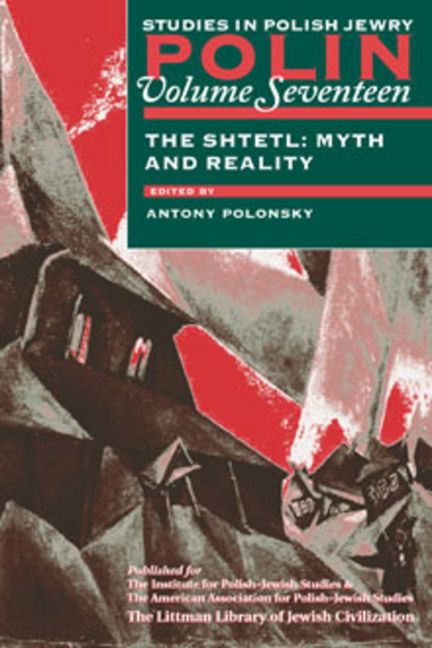Book contents
- Frontmatter
- Dedication
- Editors and Advisers
- Preface
- Polin
- Polin: Studies inPolish Jewry
- Contents
- Note on Place Names
- Note on Transliteration
- List of Abbreviations
- PART I THE SHTETL: MYTH AND REALITY
- Introduction. The Shtetl: Myth and Reality
- The Shtetl as an Arena for Polish–Jewish Integration in the Eighteenth Century
- Inter-Religious Contacts in the Shtetl: Proposals for Future Research
- The Hasidic Conquest of Small-Town Central Poland, 1754–1818
- The Drama of Berdichev: Levi Yitshak and his Town
- Polish Shtetls under Russian Rule, 1772–1914
- How Jewish Was the Shtetl?
- The Changing Shtetl in the Kingdom of Poland during the First World War
- The Shtetl: Cultural Evolution in Small Jewish Towns
- Small Towns in Inter-War Poland
- Jewish Patrons and Polish Clients: Patronage in a Small Galician Town
- Maintaining Borders, Crossing Borders: Social Relationships in the Shtetl
- The Soviet Shtetl in the 1920s
- Shtetl and Shtot in Yiddish Haskalah Drama
- Kazimierz on the Vistula: Polish Literary Portrayals of the Shtetl
- Imagining the Image: Interpretations of the Shtetl in Yiddish Literary Criticism
- Shtetl Codes: Fantasy in the Fiction of Asch, Schulz, and I. B. Singer
- Returning to the Shtetl: Differing Perceptions
- PART II NEW VIEWS
- PART III DOCUMENTS
- PART IV THE SIXTY-FIFTH ANNIVERSARY OF EVENTS IN PRZYTYK: A DEBATE
- PART V REVIEWS
- OBITUARIES
- Notes on the Contributors
- Glossary
- Index
Jewish Patrons and Polish Clients: Patronage in a Small Galician Town
from PART I - THE SHTETL: MYTH AND REALITY
- Frontmatter
- Dedication
- Editors and Advisers
- Preface
- Polin
- Polin: Studies inPolish Jewry
- Contents
- Note on Place Names
- Note on Transliteration
- List of Abbreviations
- PART I THE SHTETL: MYTH AND REALITY
- Introduction. The Shtetl: Myth and Reality
- The Shtetl as an Arena for Polish–Jewish Integration in the Eighteenth Century
- Inter-Religious Contacts in the Shtetl: Proposals for Future Research
- The Hasidic Conquest of Small-Town Central Poland, 1754–1818
- The Drama of Berdichev: Levi Yitshak and his Town
- Polish Shtetls under Russian Rule, 1772–1914
- How Jewish Was the Shtetl?
- The Changing Shtetl in the Kingdom of Poland during the First World War
- The Shtetl: Cultural Evolution in Small Jewish Towns
- Small Towns in Inter-War Poland
- Jewish Patrons and Polish Clients: Patronage in a Small Galician Town
- Maintaining Borders, Crossing Borders: Social Relationships in the Shtetl
- The Soviet Shtetl in the 1920s
- Shtetl and Shtot in Yiddish Haskalah Drama
- Kazimierz on the Vistula: Polish Literary Portrayals of the Shtetl
- Imagining the Image: Interpretations of the Shtetl in Yiddish Literary Criticism
- Shtetl Codes: Fantasy in the Fiction of Asch, Schulz, and I. B. Singer
- Returning to the Shtetl: Differing Perceptions
- PART II NEW VIEWS
- PART III DOCUMENTS
- PART IV THE SIXTY-FIFTH ANNIVERSARY OF EVENTS IN PRZYTYK: A DEBATE
- PART V REVIEWS
- OBITUARIES
- Notes on the Contributors
- Glossary
- Index
Summary
They all marched past before Martin's eyes: the grandparents, parents, children. He knew them all by name … There is the old rabbi, and at the home of Rabbi Segal, Martin was quite one of the family. He brought water several times a day, cut wood, and each Saturday he ate sabbath bread with fish in the rabbi's kitchen. And who could compare with Martin on the morning of Passover when the rebbe asked him to enter the rabbinical court? The rebbe, the judge, and the sexton waited for him. The rebbe spoke Yiddish and Martin understood every single word. The leavened bread from all over the town was sold to him, even the bread which the Jews from Melawe had not yet brought to the rebbe but which they did not trust. And he, Martin, bought the leavened bread and paid in cash. And when he left with his purchased ‘wealth’, he would bend before the court and speak in Yiddish: ‘Martin, the shabbes goy, wishes you a kosher and happy Passover.’ The face of old Martin cleared with joy, his eyes brightened, and his lips muttered Yiddish words that he had not heard in years. That there were no more Jews in Melawe, no single person to speak Yiddish with, was bad for Martin.
(J. OPATOSHU, ‘The Jew Legend)WHEN I first began research on Poles and Jews in Poland and their mutual relationship I did have preconceptions about what this relationship entailed. Through both my Dutch and my academic background I had learned of a troubled relationship. Poles and Jews lived isolated from one another in separate communities, and contacts between them were hostile owing to the virulent antisemitism of the Poles. I was still a teenager when I watched the documentary Shoah on Dutch television. For me, and the people watching with me, Claude Lanzmann's documentary established a permanent association between Poland and the Final Solution of European Jewry—concentration camps, memorial sites, concealed facts, painful memories, peasant backwardness, sorrow, resentment. In 1992, when I left for Poland to carry out my research, I was fully prepared to meet with resistance and hostility on the part of my Polish hosts and informants.
- Type
- Chapter
- Information
- The Shtetl: Myth and Reality , pp. 153 - 170Publisher: Liverpool University PressPrint publication year: 2004



